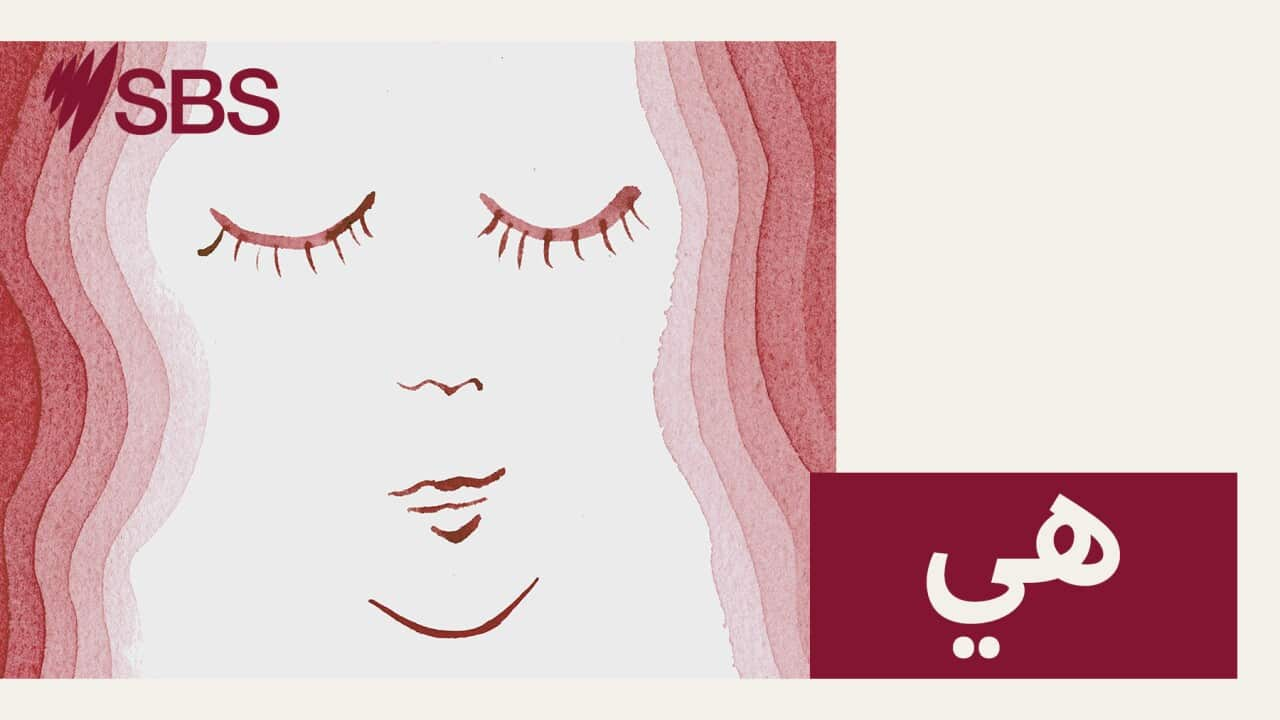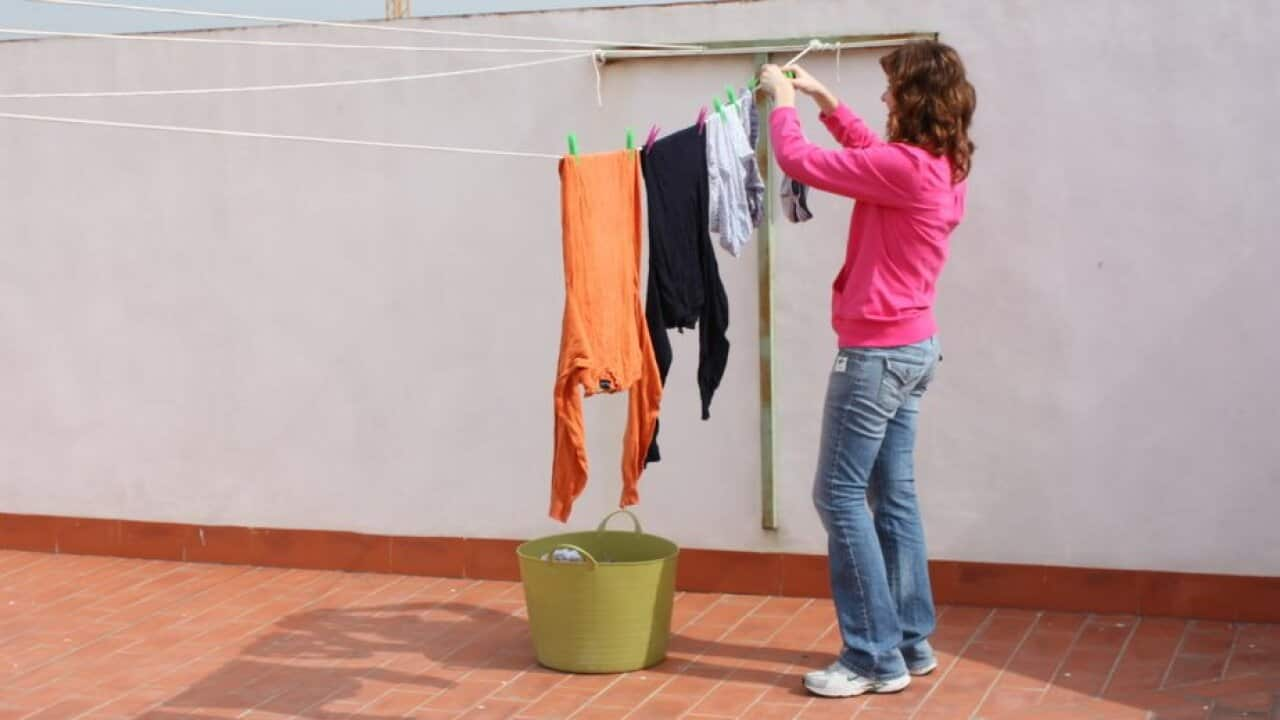Randa Kattan smiles defiantly as she talks about how people view her. They say she's "too strong" but she says she doesn't apologise or justify, that's who she is, and that's her personality.
Difficulties accessing leadership positions
Dr Malak Sukkar is the CEO of Sunshine Private Hospital in Melbourne which she is currently working on establishing. She had also founded and managed the Epping Private Hospital.

Dr Malak Sukkar with Victorian MP Frank Maguire
She said she worked in the medical field in Australia, but aspired to reach decision-making positions in hospital management to "benefit the medical staff". She decided to pursue her postgraduate studies and obtained a PhD in Business Administration and Medical Administration.
The difficulties as an immigrant woman in a new country were many and the road was not easy.Dr Malak Sukkar
"I had to equalise my degrees; I entered the university again. When you are the head of a department and come back as a student, this is difficult," Dr Sukkar said.
"I went back to the beginning, applied for 19 jobs, and found a job after 19 interviews. They asked me about my country and the war, but they didn't ask me about my experience and degrees, and after that I received a letter saying that I was not accepted for that job. I wondered 'why?'"
The challenges faced by women aspiring to leadership are varied. Wassane Zailachi is the ambassador of Morocco to Australia. She said that her involvement in the diplomatic corps was not easy at first.

Ambassador Wassane Zailachi Morocco Ambassador to Australia
The biggest challenge was changing men's mentality towards womenAmbassador Wassane Zailachi
"When I joined the diplomatic corps 32 years ago, the corps was exclusively for men while women held secretarial and administrative positions. The biggest and most difficult challenge was to change men's mentality towards women," Ms Zailachi said.
And what about a woman newly arrived in Australia carrying her suitcases and many dreams?
Hilda Maroni, owner and manager of Shamiat Restaurant, said she had self-confidence and hope to be at the head of a business in the country of opportunities. But the only obstacle for her was "the language barrier".
"I came from Syria, (and) when I arrived in Australia, I felt some anxiety and fear. The only obstacle in front of me was the language barrier," Ms Maroni said.
"For me, I did not have any other obstacle, because I have what it takes to make it to leadership positions. I was a teacher and director of a school and a cultural centre In Syria.
"But here in Australia, I do not deny that I was afraid and hesitated to start my job search at the beginning because of the language barrier.”
The CEO of Arab Council - Australia, Randa Kattan, said while she didn't have to overcome the 'language barrier', she saw difficulties in a society that still favoured men over women.

Arab Council of Australia CEO Randa Kattan at a rally demanding respect for the rights of indigenous people in Lakemba, southwest of Sydney
Our society distinguishes menMs Randa Kattan
"Of course there are difficulties, especially in our society. It is the man who is distinguished, and women stay at home," Ms Kattan said.
"Of course, women make more effort to overcome the difficulties and what they go through. This thinking also exists in the wider society. There is no equality for women.
"My difficulties are many. I have to work a lot, but I have never compared myself to men."
Statistics in Australia prove that men hold more leadership positions than women
At a time when women are calling for equality in leadership and decision-making positions in the political, economic and administrative fields, statistics in Australia indicate that there is still a long way to go.
such as the Agency for Gender Equality in the Workplace, and the Australian Bureau of Statistics in 2022 have shown that: Women hold 17.6 per cent of chair positions and 31.2 per cent of directorships [18], and represent 19.4 per cent of CEOs and 34.5 per cent of key management personnel. And 22 per cent of boards and governing bodies have no female directors. [20] By contrast, only 0.6 per cent had no male directors.
Also, 34.2 per cent of directors in the ASX 200 are women, as of 30 of November 2021. And women comprised 41.8 per cent of new appointments to ASX 200 boards as of 30 November 2021.
Although opportunities are becoming more open to women, men still dominate in the higher positionsDr Malak Sukkar
Dr Sukkar said she had experienced this in her field of work at the leadership level. Although opportunities had become more open to women, men still dominated in higher positions, she said.
"There are aspects in which men are more predominant in hospitals. Women make up the majority of the labour force, because the majority of the nursing staff is women," Dr Sukkar said.
"Among the doctors, between 50 and 70 per cent are men. But the higher we go in the field of administration, the fewer the number of women, until we reach the administrative boards where we find that the percentage has decreased a lot.”
I attend high-level meetings and I'm often the only woman in a meeting of eight or nine people, and I wonder why?Dr Malak Sukkar
Should women do more to prove themselves as leaders?
Dr Sukkar highlighted the importance of "networking" to get ahead in the corporate world.
This is difficult especially for immigrant women. We don’t go to the pub after work, hang out, and build networks. I have noticed that networking helps greatly in attaining positions at the managerial level.Dr Malak Sukkar
"As a female, you must prove that you are capable of entering this field, and it was not easy, but with the effort and work that I put in, it mitigated this view and made me advance in the field in which I am."
Dr Sukkar noted the importance of building a network of relationships in the business world but said "...as an immigrant woman, it was difficult."
She said she noticed that there were "important decisions being made, and high positions given" through her network, and she decided that she had to strengthen her "network" if she wanted to be as effective as men in leadership positions.
I work a lot but not to compete with menRanda Kattan
Ms Kattan, who spent a long time in community leadership, said that her goal was not to compete with men, but that she had to make more effort to prove herself, and now, with experience, it had become easier.
At first, I had to work harder to prove myself but with time it got easier.Ms Randa Kattan
"I do not compete with men, this is not my goal. I never thought that I should compete with men. Of course I work a lot, but not to compete with men, nor to prove my existence," Ms Kattan said.
Ambassador Zailachi said that she felt that she had to do more to prove herself at the beginning of her work in the diplomatic field.
"In the beginning, yes, this was my feeling, but, with time, it became easier. I am very proud because the responsibility that His Majesty has placed on me is a great responsibility, and the royal trust to represent him in 11 countries does not frighten me. This is a great trust and I have the ability to honour that trust," she said.
How did they reach leadership positions despite the challenges?
Between the challenges of self and society, the pitfalls of the management world, entering a diplomatic corps whose stars are mostly men, and the challenges of alienation, these women made their way towards leadership with determination and persistence, despite the challenges.
I built my reputation as a problem-solving and strategic-thinking professional.Dr Malak Sukkar
Dr Sukkar said: "The most important thing is that a person does not allow circumstances to affect them" and that she loved her work, and this "is what gives her determination and perseverance."
"I love my profession, I worked more than was required. I used to go to my boss with the problem as well as the solution. This is how a person proves their abilities, so they are not a burden on the company, but the solution," Dr Sukkar said.
“You have to think strategically, and this helps you build your name and good reputation, so people trust you.”
I am courageous and I express myself with strength.Ms Randa Kattan
Ms Kattan said that she had worked more, but not because she compared herself to men, but rather because she was brave and believed in her goal, which was to achieve social justice and equality among people.
"I communicate in a polite way, but people may feel that I am too strong, or that I express myself too much, and this is sometimes objectionable, but that is how I am and this is my personality,” she said.
Hard work, perseverance and confidence have allowed me to overcome these barriers.Mrs Hilda Maroni
Ambassador Zailachi said that hard work, perseverance, and confidence that her family and superiors had given her was what had helped her reach such a high position through which she represented her country to the world.
Ms Morani said she believed that the support of the family was important in overcoming obstacles. But self-confidence remained the most important thing in achieving what you aspired to, she said.

Carole Issa founder of Leadership Activators
What should a woman do to overcome self-doubt?
Self-confidence is an inherent characteristic of a woman leader, so how can a woman develop her self-confidence?
A person should get used to choosing courage over fear.Carole Issa
Carole Issa is a leadership skills and communication coach and founder of . She said: "Self-confidence is linked to a person's relationship with the fear of failure."
"According to how the person was raised, what their environment was like, and their relationship with failure when they were young, it evolves with them, grows, and becomes apparent in circumstances when a person is forced to get out of their 'comfort zone'.
"The idea is that a person should develop a habit of choosing courage over fear.
"Habit is like a muscle - if you don't train it, it becomes harder and harder for a person to take courage and get out of their 'comfort zone' and test their capabilities. Then it becomes easier and easier to develop and build skills."
Ms Issa advises the people she works with, whether they are business managers or team managers, to meet with people who have reached what they want to reach and benefit from their experience, and what they did to overcome the difficulties encountered along the way.
Why was New Zealand Prime Minister Jacinda Ardern praised as a leader?
When Jacinda Ardern resigned from her position as Prime Minister of New Zealand, senior political leaders praised her and her leadership style, saying that she was distinguished by firm and soft leadership at the same time, recalling her courageous and sympathetic positions following the tragic Christchurch massacre.
Australian Prime Minister Anthony Albanese praised Ms Ardern's leadership style, saying she was an example of both an outstanding and compassionate leader.
Victorian Premier, Daniel Andrews, also considered that during the COVID-19 pandemic and the terrorist attack in her country, she led in a manner that was decisive, kind and sympathetic.
Are men better than women at decision-making?
Ambassador Zailachi said that although women showed more sympathy in human relations, in the field of diplomatic work, they had to put "the national interest first."
At work, the interest of the country comes first. There is no difference between men and women.Ambassador Wassane Zailachi
"I think that women have more sympathy in human relations than men, but at work the interest of the country comes first, there is no difference between men and women," she said.
Dr Sukkar said that she did not look at making decisions from an emotional point of view, but rather how the decision would affect the interests of the workplace.
I think about the consequences of the decision and its impact on the business, not in an emotional way.Dr Malak Sukkar
"Decisions are about people's health and it is about the continuity of the hospital's work," she said.
"Do I look at the decision from an emotional or commercial point of view? The hospital must get income to continue."
Ms Kattan said that there were many factors that affected her making difficult decisions.
I learn from past mistakes and my goal remains achieving social justiceMs Randa Kattan
"Many factors affect my decision-making, talking to people, listening to them. Research helps, but it's not everything. Experience working with the community, over the years that have passed, the Randa today is not the Randa of 10 years ago," Ms Kattan said.
"There have been mistakes, but what always interests me is how to achieve social justice and equality, wherever I work. My thinking is that the system exists to serve people, not the other way around."

Hilda Maroni with her husband and son Credit: J Abo
Women empathise with the poor and people with special needs and try to build a society for them as well, not just for the rich.Mrs Hilda Morani
Ms Morani believes that a woman, with her emotional intelligence, can sympathise with people, and on this basis her decisions are beneficial to "the poor and people with special needs, not just the rich."
"I imagine that any woman who has the opportunity, the space, and the support of the community and the people around her as well, with her intelligence, can lead anything, even a state. Because a woman's intelligence, along with her emotions and reason, has an impact," she said.
"Emotions are the basis of everything. Since a woman is emotional, she feels the community around her, and is able to give more than a man who often rules his mind sometimes.
"Women empathise with the poor and people with special needs. With her emotions, she feels for the people around her, and, on this basis, she tries to help, she tries to build a society for them as well, not only for the rich class, but for the poor class as well."
Women are capable as leaders but there's still misogyny..Ms Randa Kattan
Despite the confidence in women's ability to make the right decisions, Ms Kattan said she believed that there were still those who resented women's success and questioned their decisions.
"There are times when we took decisions as a council, and they criticised us for it. There is misogyny in our Arab community," she said.
"Misogyny means they don't like to see women succeed. There is a lot of this, and we have seen it many times, when we made decisions that were not in line with the opinion of the Arab community, which is still conservative, and which still wants men to have more power than women, and this also exists in the wider community outside the Arab community in Australia, but to a lesser extent."

Former PM of Australia Julia Gillard Historical misogyny speech Source: AAP
Ms Gillard famouslyin 2012 speaking about the disdain she felt for being a woman when she was responding to then-opposition leader Tony Abbott, who accused her of “sexism."
The work must continue to open new doors for the next generation of women, men alike.Ms Randa Kattan
Ms Kattan said this view still existed, but the work had to continue to open new doors for the next generation of women and men alike.
Is the leadership personality born or is it built and developed with experience and training?
Ms Issa said that there were those who were born with a "leadership instinct," but she recommended that this instinct be strengthened and developed by working with specialists in this field, in order to benefit from it.
There are people who are not born as leaders but they can develop leadership skills.Carole Issa
"There are people who are born with the leadership personality, which I call the art of leadership or the instinct of leadership, but the problem occurs if they do not work with a specialist to help them direct it in the right way," Ms Issa said.
"But there are other people who were not born with the instinct of leadership, but they care more about developing themselves, and sometimes they become stronger and more developed than people who relied on instinct and did not develop it."
Subscribe and listen to 'She' podcast on the , SBS Audio app or on your favorite podcast app.





